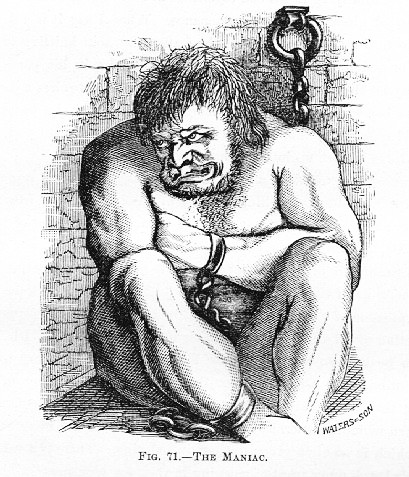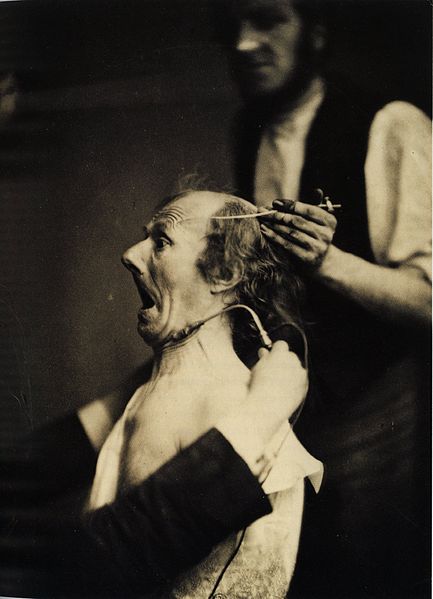A spectacularly bad psychic, the son of an undertaker and an Ed Wood actor, the Amazing Criswell rose from his coffin to lend his slack skills to the Tonight Show on New Year’s Eve in 1965.
Ideas and technology and politics and journalism and history and humor and some other stuff.
You are currently browsing the yearly archive for 2011.
A spectacularly bad psychic, the son of an undertaker and an Ed Wood actor, the Amazing Criswell rose from his coffin to lend his slack skills to the Tonight Show on New Year’s Eve in 1965.
Tags: Amazing Criswell
Can the brain be rewired to change spenders into savers? From Newsweek‘s new report on the intersection of consumer culture and neuroscience:
“As brain scientists plumb the neurology of an afternoon at the mall, they are discovering measurable differences between the brains of people who save and those who spend with abandon, particularly in areas of the brain that predict consequences, process the sense of reward, spur motivation, and control memory.
In fact, neuroscientists are mapping the brain’s saving and spending circuits so precisely that they have been able to rev up the saving and disable the spending in some people (in the lab, alas; not at the cash register). The result: people’s preferences switch from spending like a drunken sailor to saving like a child of the Depression. All told, the gray matter responsible for some of our most crucial decisions is finally revealing its secrets. Call it the ‘moneybrain.’
Psychologists and behavioral economists, meanwhile, are identifying the personality types and other traits that distinguish savers from spenders, showing that people who aren’t good savers are neither stupid nor irrational—but often simply don’t accurately foresee the consequences of not saving. Rewire the brain to find pleasure in future rewards, and you’re on the path to a future you really want.”
Hans Rosling, the Swedish doctor who did a great TED Talk about washing machines and democracy, returns to that forum to explain our world population in terms of Ikea products. (Thanks Open Culture.)
Tags: Hans Rosling
I’ve got to lose weight. Looking for anyone over 35 for walking in or near Pelham Parkway, Allerton. North Bronx, Lower Westchester, Upper Manhattan. Come on and help me out, I hate to walk alone.

"Of her descendants, 700 have been in jail, 342 were confirmed drunkards, 127 women were immoral by their own confession and 27 were convicted of murder." (Image by Charles Bell.)
You can get a bad reputation if 700 of your descendants wind up in the clink, though it may be that Temperance enthusiast Mary Annable was simply a huge buzzkill given to telling tall tales. Either way, her story of a god-awful grandmother was recorded for posterity in the May 22, 1902 Brooklyn Daily Eagle. An excerpt:
“Mrs. Mary J. Annable, president of the Kings County Woman’s Christian Temperance Union, and superintendent of rescue work of the state union, was one of the speakers at the annual convention of the New York County Woman’s Christian Temperance Union, held yesterday afternoon in Manhattan. In the course of her remarks Mrs. Annable said that she had the record of a woman who died in Brooklyn in 1827, leaving 800 descendants. ‘That woman,’ she added, ‘kept a disreputable house and was a drunkard. Of her descendants, 700 have been in jail, 342 were confirmed drunkards, 127 women were immoral by their own confession and 27 were convicted of murder.’
To an Eagle reporter who this morning sought to obtain more details regarding this woman and her many descendants, Mrs. Annable said:
‘I based my statements upon data that I received from a doctor who is interested in criminology, particularly in its relation to heredity, and has done considerable investigating with regard to the subject. I do not feel at liberty to give the name of the investigator and there is nothing new about that statement, for it has appeared in print and I have quoted the figures in other addresses. I am under the impression that while the woman died in Brooklyn she was not a native, but came from some up state section. She was 51 years old at the time of her death and I am told that within the confines of Greater New York many of her descendants are now living, some of whom are very respectable. I do not know her name, only the initials. I made that statement at yesterday’s meeting to show what rescue work as carried on by the Women’s Christian Temperance Union and other organizations means for women.'”
Tags: Mary J. Annable
Modern aeronauts capitalizing on the sun’s heat, aboard the Solar Ship. (Thanks Techling.)
In the same 1966 Playboy Interview in which he opined that homosexuality could be “cured” by LSD, Timothy Leary predicts what college kids dropping acid would eventually do with their lives:
“LEARY: Remember, it’s the college kids who are turning on — the smartest and most promising of the youngsters. What an exciting prospect: a generation of creative youngsters refusing to march in step, refusing to go to offices, refusing to sign up on the installment plan, refusing to climb aboard the treadmill.
PLAYBOY: What will they do?
LEARY: Don’t worry. Each one will work out his individual solution. Some will return to the establishment and inject their new ideas. Some will live under ground as self-employed artists, artisans and writers. Some are already forming small communities out of the country. Many are starting schools for children and adults who wish to learn the use of their sense organs. Psychedelic businesses are springing up: bookstores, art galleries. Psychedelic industries may involve more manpower in the future than the automobile industry has produced in the last 20 years. In our technological society of the future, the problem will be not to get people to work, but to develop graceful, fulfilling ways of living a more serene, beautiful and creative life. Psychedelics will help to point the way.”
••••••••••
“At Millbrook, children as young as nine were given LSD”:
Tags: Timothy Leary
From Mike Elgan of Computerworld, a descrption of the “data spill” segments of the Microsoft 2019 video I posted last week:
“In one scene, two businesspeople each place a smart object on a smart table — a keychain fob and a flat phone or smartcard of some kind. From these devices, out spills their data, which can be manipulated on the table. The same thing happens at home, where a girl’s homework spills out onto the kitchen table, and cookbook instructions spill out onto the kitchen counter.
Data and documents can apparently be transferred from anything to anything else. One business-related example involves a drag-and-drop gesture from a desktop to a mobile device. In another scene, that same mobile device becomes a virtual keyboard for a desktop computer the user happens to be sitting at.
Another example shows a man ‘capturing’ with a kind of take-a-picture gesture using a clear-glass remote control then moving data from a wall-mounted device and dumping it out onto his e-newspaper.”
Tags: Mike Elgan
A concise explanation of why labor disputes in sports are so tortuous and odd, via Tyler Cowen and Kevin Grier, on Grantland:
“Why are labor disputes in sports so weird?
The bosses control the whole sector and face little competition when it comes to hiring labor. Since the merger with the ABA in 1976, the NBA is a monopoly and operates in a manner (it monopolizes!) that would be illegal outside the sports world. Unlike in Silicon Valley, there are no NBA “start-ups.” You cannot create a new NBA team without permission of the incumbent owners. The league also has to approve changes in teams’ location and ownership.
What does this mean? The owners can get together and agree to jointly cut expenses, that is, the player salaries. Players have limited opportunities to play professional basketball in other countries, but realistically, if you are a world-class professional basketball player, you probably want to be in the NBA.
The star players are the only counterweight to management’s power. To a large extent, they ARE the NBA’s product. Because of this, the owners aren’t talking about using replacement players, and some stars are getting decent offers to play overseas during the lockout. These factors are a cause for concern for the owners and put limits on how much they can extract from the players.”
••••••••••
Final ABA Slam Dunk Contest, 1976:
Tags: Kevin Grier, Tyler Cowen
Everyone at CBS News was apparently drunk one night in 1972 as Walter Cronkite worked blue, using double entendres, and Charles Kuralt got unduly exicted about insulting and impersonating turkeys.
Tags: Charles Kuralt, Walter Cronkite

From “Building a Better Future,” a WSJ profile by Richard D. Woodward of 37-year-old Danish architect Bjarke Ingels, who dreams large-scale urban dreams:
“The youthful face of Ingels, when framed and magnified by the tiny windows in this bold project or when talking in his video lectures on the Web, offers one of the most optimistic pictures of what the future of architecture might be. At the tender age of 37 he has gained a world-wide reputation for daring to think grandly about cities in the visionary manner of Le Corbusier, and for translating his hopeful philosophy of “pragmatic utopianism” into a thriving practice that has even caught the eye of bottom-line New York real-estate developers.
Robert A.M. Stern, dean of the Yale architecture school, describes Ingels and his ‘big-picture view,’ which he first encountered at a 2008 World Architecture Festival in Barcelona, as ‘back to the future.’ The startling scale of some of BIG’s ideas ‘flies in the face of current thinking,’ which favors small-scale urbanism rather than remaking the planet.”
••••••••••
Ingels holds forth at TED, 2009:
Tags: Bjarke Ingels, Richard D. Woodward
PetMan walks, does calisthenics. From the good people at Boston Dynamics.
Jack Nicholson describes his first acid trip in a 1972 Playboy Interview:
Jack Nicholson:
I was one of the first people in the country to take acid; it was in laboratory experiments on the West Coast about nine or 10 years ago. At that time, I was a totally adventurous actor looking for experience to put in his mental filing cabinet for later contributions to art. I was very curious about LSD. Some of the people I knew were in therapy with it. I went to downtown LA and took it one afternoon. I spent five hours with a therapist and about five more at home in the later stages of it. I hallucinated a lot, primarily because of the way the therapist structured it. He put a blindfold on me, which makes you much more introspective, gives you more dreamlike imagery. Imagine what acid is like when you know nothing about it. You think it’s going to be like getting stoned on grass, which I had done. But all of your conceptual reality gets jerked away and there are things in your mind that have in no way been suggested to you: such as you’re going to see God; or watch sap streaming through the leaves of trees; or you’re going to feel the dissolving of certain bodily parts; you’re going to re-experience your own birth, which I did on my first acid trip; you’re going to be frightened that your prick might be cut off, because you have castration fears; you’re going to come mush-ass to face with your own homosexual fears. I just wasn’t ready for half this stuff.•
_____________________________
Nicholson invests in hydrogen cars, 1978:
Tags: Jack Nicholson
A year after Woody Allen interviewed Billy Graham, he guest hosted a 1971 Tonight Show for Johnny Carson. No monologue but Ed McMahon is there as well as guests Bob Hope and James Coco. Hope was Allen’s favorite comic. The final part of the show doesn’t seem to be online.
Tags: Bob Hope, James Coco, Johnny Carson, Woody Allen
In the Boston Globe, Samuel Arbesman’s uses cliodynamics, which applies math to history, to predict if America will flourish or fall. An excerpt: from “How Long Will America Last?”:
“This data set is expansive, including everything from the Babylonian Empire of ancient Mesopotomia — known for such contributions as Hammurabi’s Code — to the Byzantine Empire, which has provided us with the eponymous word for red tape. Some of the world’s empires lasted an exceptionally long time: The ancient, and now little known, Elam empire located in present-day Iran lasted a thousand years. Others were short-lived, for all their power: The Phrygian and Lydian empires were around for only about six decades each. (The data set, based on earlier research in empires, ends at 600 A.D.)
If you crunch these all together, the first thing you discover is that the average lifetime of these powers is 215 years.
If you’re playing at home, this number is pessimistically eerie: It’s been 223 years since the ratification of the US Constitution. And that should perhaps give us some pause. To make this explicit, the United States has now outlasted the majority of the empires in my historical data set, and is now crossing the threshold into hoary old age.
But there is a more interesting way to look at it than simply taking an average. By putting all the life spans together, we can see a pattern that statisticians call a distribution — the underlying shape of the ‘density’ of the life spans. Distributions give us a much better sense than the average because, just as with incomes, life spans needn’t be distributed like a bell-shaped curve. They can be skewed towards one end or the other.”
Tags: Samuel Arbesman
Great find by the Electric Typewriter in uncovering “Farewell, My Lovely!” E.B. White’s 1936 New Yorker paean to Henry Ford’s Model T, the car that made America a car country. The opening:
“I see by the new Sears Roebuck catalogue that it is still possible to buy an axle for a 1909 Model T Ford, but I am not deceived. The great days have faded, the end is in sight. Only one page in the current catalogue is devoted to parts and accessories for the Model T; yet everyone remembers springtimes when the Ford gadget section was larger than men’s clothing, almost as large as household furnishings. The last Model T was built in 1927, and the car is fading from what scholars call the American scene—which is an understatement, because to a few million people who grew up with it, the old Ford practically was the American scene.
It was the miracle God had wrought. And it was patently the sort of thing that could only happen once. Mechanically uncanny, it was like nothing that had ever come to the world before. Flourishing industries rose and fell with it. As a vehicle, it was hard-working, commonplace, heroic; and it often seemed to transmit those qualities to the persons who rode in it. My own generation identifies it with Youth, with its gaudy, irretrievable excitements; before it fades into the mist, I would like to pay it the tribute of the sigh that is not a sob, and set down random entries in a shape somewhat less cumbersome than a Sears Roebuck catalogue.”
••••••••••
Henry Ford’s funeral, 1947:
Tags: E.B. White, Henry Ford
Woody Allen interviews Rev. Billy Graham, 1970.
Tags: Billy Graham, Woody Allen
It seems that right around 1900, the only employees Bellevue Hospital could get to work in its Morgue were complete alcoholics. Luckily, Bellevue also had an Alcoholic Ward. An excerpt from a May 7, 1901 Brooklyn Daily Eagle article:
“There were many new faces among the helpers at Bellevue Hospital, Manhattan, this morning, owing to the suspensions last night and arrests for drunkenness. The alcoholic ward contains many of the late helpers. The new assistants come from the convalescent patients and the city lodging house. The disgraceful row last night between two stretcher bearers of the Morgue brought out the alarming degree of dissipation at Bellevue following each pay day.
It has long been a notorious fact that the attendants at the Morgue are seldom the same for any two weeks. Superintendent Rickard said that responsible men cannot be gotten for from $10 to $12.50 a month. Yesterday, he said, there was a greater degree of intoxication at the institution than ever before, although it has been bad enough at any time.
A couple of days ago a rough and tumble fight occurred between the chef, a man named Vozen, and his assistant, named Hopkins. Hopkins, while intoxicated, got Vozen down and began to pound him and had him almost knocked out when help arrived. Hopkins was suspended. Vozen was incapacitated for work.

"A couple of days ago a rough and tumble fight occurred between the chef, a man named Vozen, and his assistant, named Hopkins."
John Roff, attendant at the Morgue, came into the place Sunday with a pair of black eyes, face scarred and lacerated and so drunk he could hardly walk. He was suspended and on the announcement of his decision said he would lick the whole staff.
John Dunn, an attendant, rode into Bellevue this morning in a hansom cab. He was so badly intoxicated that he had to be carried from the cab. He wore a bouquet of lilacs and violets. He wore a silk hat, which had seen much usage. He was put in his cab and driven from the grounds and is riding about yet, so far as the hospital people know.
 Another attendant came to Bellevue this morning with a strong smell of liquor on his breath and when he found the treatment that had been meted out to his associates he rushed into a ward and sprinkled checkerberry on his mustache. He was sober enough to go to work, but the odor of wintergreen is offensively palpable.
Another attendant came to Bellevue this morning with a strong smell of liquor on his breath and when he found the treatment that had been meted out to his associates he rushed into a ward and sprinkled checkerberry on his mustache. He was sober enough to go to work, but the odor of wintergreen is offensively palpable.
George Lewis, an attendant, who has been suspended for drunkenness before, was ‘disgustingly’ sober, as one hilarious attendant said this morning, and was put to work in Roff’s place. He said he would never touch liquor again.
Superintendent Rickard said that drunkenness among the attendants was very common, but it was more flagrant this month than ever before. The attendants are paid every month. The men and women are such people as to be unable to get work anywhere else and look forward every month to their pay for intoxication. Some can not wait for pay day and get orders and go down town and cash them. The only remedy for this, Superintendent Rickard says, is to pay more wages and get a better class of attendants.”
Wireless charging for electric cars is the goal of automakers. From Scientific American:
“‘Almost universally, all the carmakers have learned…that consumers find plugging in a vehicle is inconvenient, and the carmakers have concluded they need to offer some type of wireless, hands-free charging,’ says David Schatz, director of business development and marketing for WiTricity Corp. in Watertown, Mass., which makes wireless chargers for phones and cars. With WiTricity’s system, a user would not have to park his or her car directly on a charging mat, let alone deal with wires. As long as the car is within range of the charging station, energy begins to flow into the battery.”
••••••••••
“Allows for efficient non-stop operation”:
Tags: David Schatz
CBS News is bringing back it’s “On the Road” segments, which were helmed with distinction by Charles Kuralt. Here’s a great 1976 report about the 1847 massacre of the Whitman missionary family in Washington state.
1976 Charles Kuralt “On the Road” Segment on the Whitmans. from Larry Cebula on Vimeo.
Tags: Charles Kuralt, Narcissa Whitman
Walter Isaacson, a writer who can communicate complicated ideas lucidly, was the perfect biographer for Steve Jobs, a technologist who could make complex functions work simply. Steven Johnson offers up his thoughts on Isaacson’s Jobs bio immediately after reading it. An excerpt:
‘While Jobs historically had a reputation for being a nightmare to work with, in fact one of the defining patterns of his career was his capacity for deep and generative partnerships with one or two other (often very different) people. That, of course, is the story of Jobs and Woz in the early days of Apple, but it’s also the story of his collaboration with Lasseter at Pixar, and Jony Ive at Apple in the second act. (One interesting tidbit from the book is that Jobs would have lunch with Ive almost every day he was on the Apple campus.) In my experience, egomaniacal people who are nonetheless genuinely talented have a hard time establishing those kinds of collaborations, in part because it involves acknowledging that someone else has skills that you don’t possess. But for all his obnoxiousness with his colleagues (and the book has endless anecdotes documenting those traits), Jobs had a rich collaborative streak as well. He was enough of an egomaniac to think of himself as another John Lennon, but he was always looking for McCartneys to go along for the ride with him.’
Tags: Steve Jobs, Steven Johnson, Walter Isaacson
Who doesn’t need, sometimes, to be where the streets have no name? An excerpt from Jesse McKinley’s survey of Death Valley in the New York Times:
“IT’S just before midnight on the edge of Death Valley and I’m standing in a dark room in the Amargosa Opera House and Hotel with five people who are certain that we’re talking to ghosts.
‘There’s something going on,’ said one ghost hunter who is holding a device meant to find electromagnetic fields. Sure enough, it’s going wild. And while I don’t believe in ghosts, I have goose bumps.
Death Valley National Park doesn’t need a lot of help being spooky. One of the lowest, most arid places on earth, the valley has more ghost towns than actual ones: dried-up spots like Leadfield, Chloride City and Skidoo, whose last residents skedaddled as soon as the gold, or rumor thereof, was gone.
Even the places that survive have foreboding names like Furnace Creek or haunted reputations like Death Valley Junction, just outside the park’s eastern gate, where paranormal fans convene to hunt the spirits of miners, mistresses and other metaphysical outliers. Then there are anomalies like the park’s Racetrack Playa, where rocks seemingly slide across sand under their own power.
Death Valley’s mysteries and its extremes have always intrigued me.”
Tags: Jesse McKinley
Peter Sellers goofing around during a rare talk-show appearances, 1970.
Sellers works broad with Dean Martin, 1973:
More Peter Sellers posts:
Tags: Dean Martin, Peter Sellers